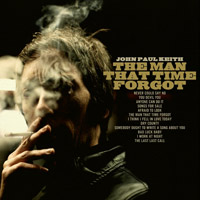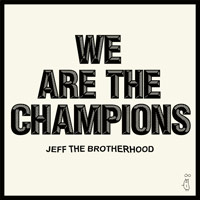
Goodbye Bread
Drag City
I think Ty Segall’s been spoiling us. He released two brilliant albums (Ty Segall and Lemons) of noisy gunk churned with pop fragments in quick succession at the end of 2008/beginning of 2009, then followed up with a psych-inflected gem (Melted) last year. And live, his sets have been so sweet (and relatively short) that they left one nearly aching for more. So it may be no surprise that Goodbye Bread, his first record for Drag City, is something of a letdown, both figuratively and metaphorically. I mean, it was bound to happen.
From the onset, Segall’s approach is less frenetic than it’s been in the past, instead favoring deliberate and crunchy riffs over manic ones. On the title track, he leads with post-Beatle melodies, tying his guitar lines to sweetly sung lines coated in sleepy reverie. The tactic is similar on “You Make the Sun Fry,” only the riffs are fuzzier and Ty’s less concerned with hitting the high notes. Perhaps, as indicated on “Comfortable Home (A True Story),” a song detailing the greater meaning of buying a sofa, he’s become domesticated.
Maybe not. The second half of the record seems to discount that theory, or at least it’s more exciting. He returns to lysergic regions, especially on “My Head Explodes,” where he switches from pastoral tones to fuzzy, er, explosions in quick succession. “The Floor” continues down the rabbit hole, delving into heady breezeways tainted with thick riffs and acoustic accents. Finally, by “Where Your Head Goes,” Segall has found the record’s comfort zone, but unfortunately it’s taken half the album to get there. Perhaps, he was going for the slow build—and that’s something to be admired in these days of instant gratification—but I guess I liked it better when he just cut to the chase.
Stephen Slaybaugh
MP3: “You Make the Sun Fry”

From Africa with Fury: Rise
Knitting Factory
Playing on every beat makes every hit on time. The trick is being able to make the same hit happen twice. That is the only way to make it sound “right,” even if it may have sounded off time at first. This is a step beyond syncopation and into a cross-rhythmic territory that can be a bit daunting for a listener. Maybe this is why you don’t hear much Afrobeat or Krautrock on pop radio. A full polyrhythmic record can be as fun as a James Brown groove, but still as challenging as a Can album. But for complex reasons like lazy production or simple reasons like the drummer ignoring the crucial weight of a single hi-hat accent, it can also be a tedious task. Afrobeat has come a long was since the late ’60s, when über-frontman Fela Kuti and drummer Tony Allen invented the genre, but there are still many more missteps than advancing strides. Lucky for Seun Kuti, his father Fela handed him Excalibur in the form of his backing band, Egypt 80, effectively crowning him king of the genre without so much as a full-length record under his belt.
From Africa with Fury: Rise is Seun’s second long-playing effort to date, and he’s proven that he’s no fluke. He’s got a big throne to fill, and Seun rules supreme from the first gong hit on the opening track, “African Soldier.” About halfway through the politically charged jam, Seun whips the multiple beats together, vocally directing the musicians into a straight rhythm in a way I’ve never heard before and then yowling like Scratch Perry and releasing the band back into their respective directions. It’s magical, and it doesn’t stop there. The energy packed into this record is palpable, even on the slower groove of the title track, which focuses more on brass solos than on the army of percussion complimenting Seun’s smooth growl. The man knows when to hide in the background and let the horns shine, but when he takes the spotlight... well, lets just say it’s obvious he’s been fronting with the band since Fela’s death in ’97. Am I allowed to say that he’s a more exciting sounding frontman than his father?
Seun is the culmination and embodiment of years of musical experience and expertise; he was obviously paying attention when he was onstage with his dad as a child. On a side note, Brian Eno co-produced this album. Usually that means a monumental record and something that should be discussed. Honestly, I couldn’t tell from the first listen and didn’t know until reading the liner notes afterwards, but I suppose I have Eno to thank for the dynamic production. Whatever, From Africa with Fury: Rise, even without big names like Eno and Kuti, would stand on its own as a great record, and I can’t stop listening to it.
Michael P. O’Shaughnesy

The Man That Time Forgot
Big Legal Mess/Fat Possum
Journeyman singer-songwriter and guitarist John Paul Keith is a veteran of the music business trenches. A former member of the V-Roys (nee Viceroys) and leader of now-forgotten acts the Nevers and Stateside (who occasionally backed up Ryan Adams as the Pink Hearts), Keith didn’t find his true groove until moving to Memphis, a place to which he ventured ostensibly to give up on rock & roll, in the mid 2000s. After a few years in town, though, he was back at it, fronting the One Four Fives and working with local mainstay Jack “Oblivian” Yarber.
Keith and his cohorts’ second full-length, The Man That Time Forgot, offers pitch-perfect retro rock that touches on topics familiar to all lifers, such as an inability to score booze (“Dry County”), make money (“Afraid to Look”), and stay off the road (“Never Could Say No”), while also funneling larger themes of ambition, defeat, love and loss through the prism of being a work-a-day musician. Though his compositions are never especially complex—with “one four five” providing not only the inspiration for his band’s name, but likewise the basic foundation for nearly his entire repertoire—their simplicity belies expert songcraft and a love of the raw immediacy of vintage Americana tunesmithery. The One Four Fives weave seamlessly through Sun licks, Texas swing, honkytonk balladry and Bakersfield rhythms. And while there are plenty of hard times and rough luck throughout these dozen tunes, the overall feel is upbeat and fun.
The more nostalgia-driven aspects of Keith’s sound are occasionally reminiscent of Chris Isaak, minus the latter’s cologne commercial schmaltz. Yet, at this point in pop music’s continually bizarre evolution, it’s tough to imagine Keith ascending to the commercial heights that Isaak was able to achieve—that feat in its own right was always a bit of an anomaly—without making precisely the commercially oriented decision that apparently drove him out of the business in the first place. But based on The Man That Time Forgot’s endless charm, one also gets the sense that Keith is more than happy to be right where he is: in Memphis, Tennessee, making rock & roll records.
Nate Knaebel

EVINSPACEY
Daylight Curfew
Evinspacey, Jason Drake’s newest release under his Cassettes Won’t Listen moniker, starts out with some promise. “Friendly Float” is the kind of instrumental you’d expect to find on label-wide sampler from the Def Jux days. It’s fully-formed, seems to have a bit of narrative thrust, and even has a few synth settings you may not have heard a million times before. It’s the kind of beat I was looking forward to hearing more of, but as soon as that track ends, all semblance of rewarding listening disappears. “Perfect Day,” clearly meant to be the big single, just sounds like an over-produced Ben Folds outtake. Next track. “The Echoes” desperately wants to be grimy, even grating maybe, but Drake just doesn’t have the guts. Is this his idea of a deep bass track? Even iTunes’ bass booster equalizer setting can’t dig out the low end.
Inspired by the middle third of the album, (“The Kingdom,” “The Night Shrines,” “Turn Back the Other Way” and “Harp Darkness”), I thought about making an argument along the lines of “this is what happens when the means of production become available to the masses.” These songs are so trite I bet they really could have been built on unedited Garageband loops. Worse, it seems like Drake didn’t even put much effort into each song. Amateurish vocal tracks, unrefined lyrical ideas, insipid production—is it possible to be shockingly bland? The sounds and the emotions are both wafer thin. The only track that he really pulls off with this style is “Stuck,” which at least seems like he meant it to be a flimsy, mechanized product of the post–Postal Service age.
If Hot Chip’s brand of electronica is too cartoonish or inoffensive for you, don’t get anywhere near this. You’ve heard all these gestures before, but you’ve never heard them used with so little regard for how they might actually work musically to create a captivating moment. And it’s so frustrating, ’cause this guy does have potential. What’s ultimately most disappointing about this set is that it’s far less compelling than anything else Drake has released—free mixtapes, spotty compilations, and Yak Ballz remixes included.
Matt Slaybaugh
MP3: “Perfect Day”

We Are the Champions
Infinity Cat
Lately, I’ve been thinking of letting myself drift away into cranky old-manhood. Not that I’m all that old, but it’s beginning to seem unavoidable anyway. Especially when I hear a record like We Are the Champions, the sophomore effort from Nashville duo Jeff the Brotherhood. It’s not that I don’t get it: there’s nothing complex enough going on here to misunderstand. It’s not that it’s too modern for me: this is pretty straightforward rock & roll, the kind that’s been made for the last 40 years or so. I guess, if pressed, the problem is I can tell that Jake and Jamin Orrall are obviously having a blast, and I don’t like it one bit.
Sort of. Or at least, I don’t care for the end result of such shenanigans. As a two-man band, Jeff’s songs are largely guitar plus drums, with maybe an extra track of riffs or synths thrown in for good measure, coming together to create a trebly pop sound that would make Billy Squire smile. If they were smarter or had more balls, they could maybe be Swearing at Motorists. As it is, they’re just churning out insubstantial feel-good rock light enough to float on water. Call me a crank, but as a bigger man than I (Mike Muir) once said, me, I want more.
Stephen Slaybaugh
MP3: “Shredder”
ALBUM REVIEWS
Thee Oh Sees, Castlemania
Antipop Consortium, Knives from Heaven
Oneida, Absolute II
Nigeria 70—Sweet Times
Ford & Lopatin, Channel Pressure
Arctic Monkeys, Suck It and See
The Ladybug Transistor, Clutching Stems
City and Colour, Little Hell
Seapony, Go With Me
Death Cab for Cutie, Codes and Keys
My Morning Jacket, Circuital
Friendly Fires, Pala
Ear Pwr, Ear Pwr
Various Artists, Blow Your Head V.2: Dave Nada Presents... Moombahton
